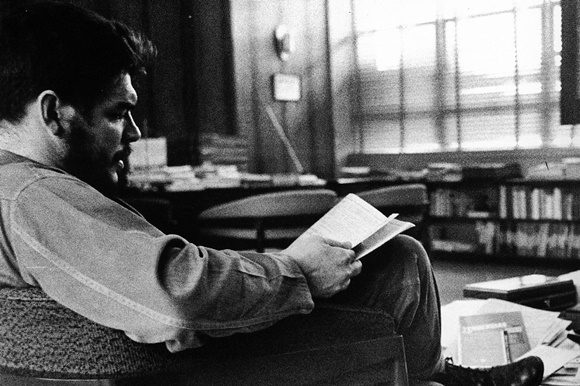On the 95th anniversary of the birth of Ernesto Guevara de la Serna (1928-1967), I have decided to honor his memory with an evocation of his prolific intellectual and spiritual production in the fields of revolutionary literature and journalism.
The first approach of the "Heroic Guerrilla Fighter" to these humanistic disciplines, perceived as an inexhaustible source of ethics, patriotism, humanism and spirituality, dates from his earliest childhood when the future doctor devoured the classics of universal literature and was an avid reader of the newspapers and magazines that circulated in the city of Rosario, the homeland where he first saw the light of the Astro Rey.
The systematic readings of books and periodicals were leaving an indelible mark on the memory archive of the undefeated Commander of America, and thus, "little by little, as truth comes limping from the hand of time", according to the Greek philosopher Annon, he was forging the vocation that —years later— would make him, in his own right, a prolific writer and journalist; professions that he dignified with the right exercise of him.
One of the first and most important titles that, as a writer, he gave to the print was El socialismo y el hombre en Cuba , published after the triumph of the rebel arms in the largest island of the Antilles, his second homeland, to which he loved—like humanity—with all the forces of his spiritual being.
After the treacherous crime of which he was a victim in the rural school of La Higuera, in Bolivia —today the Plurinational State of Bolivia—, El diario del Che appeared, published in our country and re-edited in several nations around the world, in addition to the books The Motorcycle Diaries , The Guerrilla War and Passages of the Revolutionary War , among other titles that have been posthumously seeing the light of publicity on five continents.
The doctor-guerrilla was a writer with a literary style that reflects —with crystal clarity— the coherence that existed between the cognitive, affective-spiritual, and conative spheres, which make up the charismatic personality of the Hero of the Battle of Santa Clara; ways of thinking, feeling and acting in which the slightest fissure or contradiction was never manifested, since he was a man who led by example.
The method used by Che to transmit to the reader thoughts, ideas, feelings, facts, situations, or passages, which —in one way or another— had influenced his inner world, was characterized by establishing a fluid author-reader link; essential basic requirement to be able to achieve the main objectives that he set himself while he was creating: to instruct, educate and entertain, with the help of humorous anecdotes, because he never lost his sense of humor, although it should be noted that it was a cutting and sharp humor, characteristic of of the basic personality of the sons of the homeland of Don Domingo Faustino Sarmiento (1811-1888).
The language was clear, flat, direct, without linguistic arabesques that would make it difficult for the reader to understand and comprehend the ethical-humanist message that each of his literary works implicitly carries.
Che was a unique and unrepeatable writer, just like his person, marked by simplicity, humility and loyalty to Fidel and the Revolution; traits that would identify him in the mountains or in the plains, as well as in war or peace.
Revolutionary journalism was another of the great vocations that he cultivated with reason and emotion, because, like the award-winning writer and journalist Gabriel García Márquez (1927-2014), Nobel Prize for Literature, he defined our noble profession as "literature in a hurry". . "El francotirador" (the pseudonym he adopted to write in the Verde Olivo magazine ) successfully ventured into almost all journalistic genres, in which he captured —from an objective subjective perspective par excellence— the revolutionary conceptions about how it should develop in our geography insulate the socialism that he dreamed of for the people who contributed to humanity men of the exceptional stature of the venerable father Félix Varela Morales ,, José Martí PérezAntonio Maceo Grajales and Fidel Castro Ruz.
Political and philosophical-ideological conceptions, marked —fundamentally— by the ethical-humanist approach that he gave to his collaborations, not only with the organ of the Revolutionary Armed Forces (FAR), but also with other national and foreign media, which They welcomed the articles, comments, chronicles and reviews of those who offered their precious life, in a dark corner of the Andean nation, for the freedom of the great Latin American homeland.
The prose used in his journalistic texts was adjusted to the cognitive and spiritual needs of the readers, so that they could not only apprehend the ethical-humanist message that —as in his prolific literary work— he sent them through the press but also that they internalize it and incorporate it into their coping style, which would make them, without a doubt, better revolutionaries and better human beings.
Lastly, Ernesto Guevara de la Serna praised contemporary literature and journalism; disciplines of which he was —and he is— one of the most prominent figures, and whose journalistic-literary work is absolutely necessary to revisit over and over again.
Eternal glory to the memory of such an illustrious revolutionary writer and journalist!
***
Text adapted by the author for Cubaliteraria from the article "Che: journalist and revolutionary writer" published on the Radio Progreso website in October 2020.


Deje un comentario